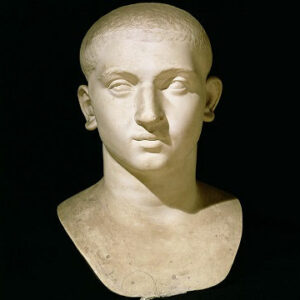Alexander Severus, sometimes known as Marcus Aurelius Severus Alexander Augustus, was the last of the Severan dynasty’s emperors. From 222 until 235, he ruled the Roman Empire. Civil warfare, foreign invasions, and the monetary economy marked his tenure. When he ascended the throne as a youth, Alexander was little more than a puppet in the hands of his strong mother, who held the real authority. The young emperor was merely a pawn in his mother and grandmother’s network of political schemes in order to gain power. In 218 Alexander’s cousin Elagabalus, who was still a teenager, was proclaimed emperor. Elagabalus was urged by their grandmother to adopt Alexander in order to make him the heir apparent. The grandmother then had Elagabalus slain in 222, resulting in Alexander Severus’ ascent to the throne. Alexander struggled to complete his tasks in a timely and orderly manner after being thrust into such a powerful and responsible position so early in his life. This was especially true during times of political instability. In 235, his tumultuous reign came to an end when he and his mother were assassinated by his own men.
Childhood and Adolescence
Marcus Julius Gessius Marcianus, a Syrian Roman Aristocrat, and Julia Avita Mamaea, a powerful Roman woman, had him on October 1, 208. Julia Maesa, his maternal grandmother, was a woman with ambitious political ambitions.
He was educated in literature and military duty from an early age. Valerius Cordus, Titus Veturius, and Aurelius Philippus were among his tutors.
He was a charming young man who enjoyed socializing with his peers. He was a humble man who dressed in plain white robes and cloaks and disliked imperial garb and jewelry.
Reign & Ascension
Elagabalus, his cousin, was crowned emperor in 218. Elagabalus was only 14 years old at the time, and his grandmother Julia Maesa had played a key part in his ascension to the throne.
Julia Maesa used her power to urge Elagabalus to adopt and proclaim Alexander as the heir apparent. Elagabalus later changed his mind, and reports circulated that he considered Alexander as a threat and meant to eliminate him.
Elagabalus was slain by Praetorian Guard men in 222, in a scheme devised by his own grandmother to bring her other grandson to power. At the age of 13, Alexander became Emperor without opposition.
He was frequently supervised by his mother and grandmother because he was too young to reign on his own. Despite his youth, he made every effort to reign in the best interests of his people.
He allegedly organized a board of 16 senators and engaged well-known jurists to administer justice. He abolished the imperial court’s excessive expenditures and established a 14-member local council.
When it came to religious things, he was very open-minded and intended to build a temple for Jesus, despite being counseled against it. He approved the construction of a synagogue in Rome.
He was sympathetic to the soldiers and adopted a number of laws that benefited them. Soldiers were given the ability to name anyone as an heir in their will, which civilians did not have at the time.
Even though he ruled successfully during peacetime, he lacked the leadership abilities necessary to safeguard his people during wartime. The Sassanid king Ardashir I conquered the Roman province of Mesopotamia in 230 and 231.
Alexander’s army lacked the discipline to withstand such an onslaught, yet he was able to defend his land for the time being. In 232, however, a mutiny occurred, and Taurinus was proclaimed emperor. Alexander was able to put down the rebellion, and Taurinus drowned and died while attempting to flee.
In 234 another hostile onslaught occurred when German barbarians crossed the Rhine and Danube and arrived at Rome’s borders. The sudden onslaught infuriated Alexander’s soldiers, who were already disillusioned by their emperor’s incompetence.
He did his hardest to lead his men against the Germans in the war, but he lacked the necessary qualities to be a successful commander. He sought to pay off the German tribes in a desperate attempt, which enraged his own warriors greatly. After this occurrence, he was deemed unfit to be Emperor and was slain by his own troops.
Personal History and Legacy
He became Emperor at the tender age of 13 and was thus heavily reliant on his mother and grandmother for instruction, and following his grandmother’s death, completely on his mother.
He had three wives. In 225, he married Sallustia Orbiana, whom he divorced in 227. Sulpicia Memmia, a member of an ancient Patrician dynasty in Rome, was his second wife. He also had a second wife, the identity of whom remains unknown. With none of his spouses, he had no children.
Due to his inefficiency, notably during the German war, he had become quite unpopular among his own soldiers. On March 19, 235, Alexander and his mother were assassinated. He was the final ruler of Syria.
The Severan dynasty came to an end with his death.
Estimated Net Worth
The estimated net worth of Alexander Severus is unknown.


